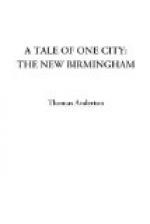As I have hinted, I heard a good deal of Mr. Chamberlain’s public speaking when he first came to the front as a public man, and it was impossible not to be interested, edified, and oftentimes amused by the intelligence, point, and smartness of his speech. At the same time there was—especially in the earlier days of his public career—a certain setness and formality of style that suggested the idea that his speeches were anything but the inspiration of the moment, but had been made beforehand, and were being reeled off. Indeed, many of those who knew him well maintained that his speeches were at this time the result of painstaking study, care, and elaboration, and that those who had a nose for oratory might detect in them a strong smell of the lamp.
One incident that came under my notice certainly went far to corroborate this view. I refer to the occasion of a little semi-public dinner at which Mr. Chamberlain was put down to propose a certain toast. He proceeded for a time in his usually happy, characteristic manner, when all at once in the middle of a sentence he came to a full stop! We all looked up, and he looked down embarrassed and confused. He apparently had lost the thread of the discourse he had so carefully woven; he could not pick up the dropped stiches; and, if I remember rightly, he sat down, his speech not safely delivered.
It seems difficult now to fancy Mr. Chamberlain making such a fiasco. He is at the present time probably one of the most ready and fluent speakers we have, and although many strange things might happen in the House of Commons, one of the most astonishing would be to see Mr. Chamberlain break down in a speech. It would create a sensation in that unserene assembly which would almost be enough to make a seasoned pressman swoon, and before the incident had been completely realised the unexpected and startling fact would probably be known at the Antipodes. Mr. Chamberlain can now make his speeches as he goes on—although the material may be prepared beforehand—and, as we know, he can turn from the course of his argument to answer quickly and effectively some pertinent or impertinent question or interruption.
Since Mr. Chamberlain has become such a leading light in Parliament, his speeches have taken a much more solid, sedate, and serious tone than they had in his early Birmingham days. They have become considerably more weighty—perhaps some of his unfriendly critics would say more heavy—than they were in bygone times. Without being open to the charge of levity or flippancy, Mr. Chamberlain’s speeches used to be remarkable for a certain amount of humour, banter, touch-and-go smartness, as well as terse argumentative force.




